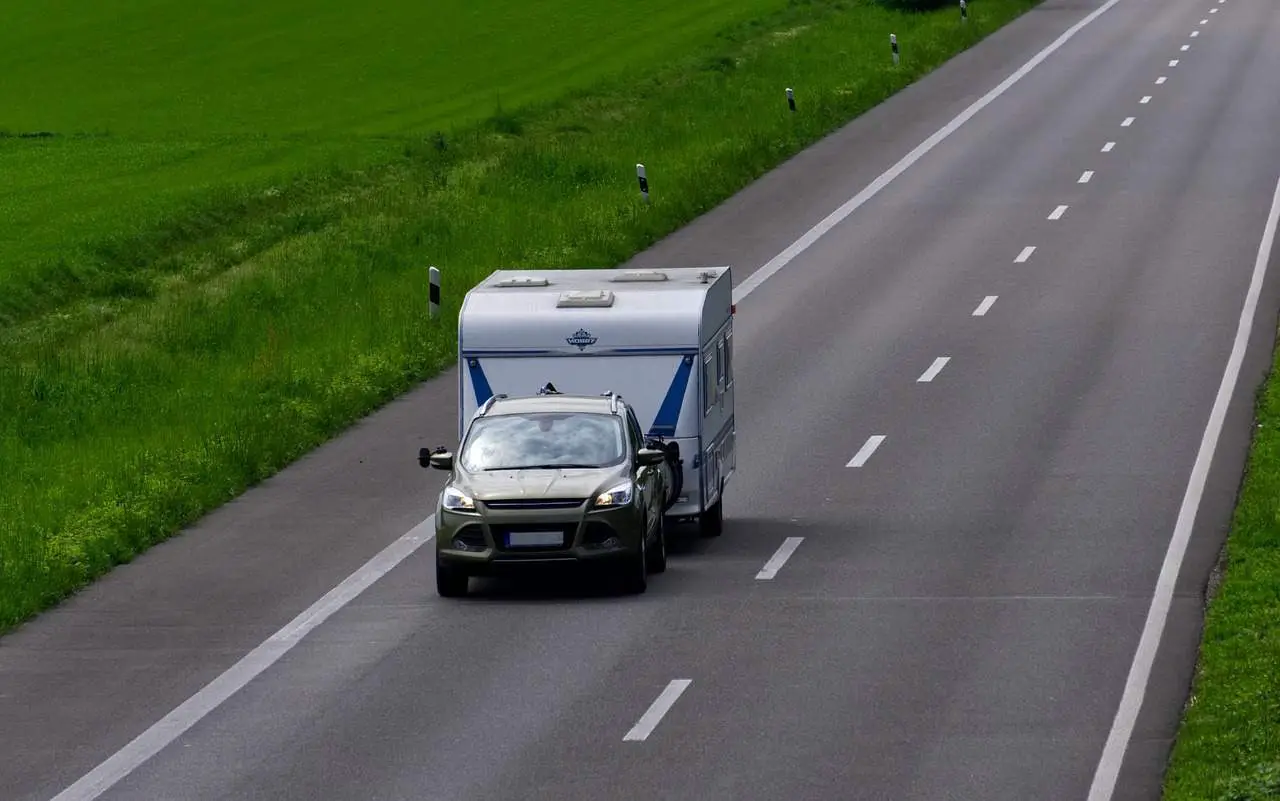Learning how to tow a travel trailer can be daunting, especially if the rig is generously sized. In fact, for some would-be adventurers, it’s downright off-putting. While tenting provides another option, it just isn’t feasible for everyone. We would hate to think that anyone would deprive themselves of the pleasures of camping just because they’re nervous about trailer towing. That’s why we’ve compiled this list of nine easy tips for towing a travel trailer.
9 Tips For Towing A Travel Trailer
1. Understand Your Vehicle’s Towing Capacity
The first thing you need to understand is that your tow vehicle can only support so much weight. Before you attempt to hitch a travel trailer to your pickup truck or SUV, you’ll need to run a few numbers.
The maximum towing capacity of a tow vehicle is usually listed in the owner’s manual. Alternatively, you can look for the number just inside the driver’s side door, where the VIN number is printed. The towing capacity is sometimes listed there as well. If all else fails, the information can be found online.
Once you know the towing capacity, it’s time to calculate the gross weight of your travel trailer. To get this number, you’ll need to add together the gross trailer weight, the tongue weight, and the curb weight of your trailer, along with the payload (the weight of any cargo and passengers). If the number falls below the trailer towing capacity of your vehicle, you’re good to go.
Whatever you do, don’t attempt to hitch up the trailer if the total weight is higher than the vehicle’s listed towing capacity. Hauling an overly heavy trailer is tough on the driver, not to mention the engine and transmission.
2. Don’t Pack Too Much
Packing light is always a good idea when camping, but as towing tips go, it’s essential. The less you pack, the lighter your load will be. This will take stress off the vehicle and make the trailer that much easier to tow.
To ensure that you don’t forget any essentials, make a list of your planned daily activities before you start packing. There’s no need to pack the kayaks if you’ll be spending all of your time in the desert. On a similar note, plan out your meals and bring along only the ingredients and utensils that you’re sure to use.
Finally, when it comes to entertainment, keep it simple. Paperback books are lighter than cloth-bound versions, and a Kindle or tablet will weigh even less. If you’ll have access to Wi-Fi, you can rely on streaming for movies and TV shows and leave the DVDs at home.
3. Make Sure Weight Is Evenly Distributed
This is a factor that many beginners overlook. For a smooth driving experience, the RV’s load weight distribution should be focused on the front end of the trailer. If more than 40 percent of the total weight is gathered in the rear, the trailer becomes that much more difficult to control.
Because the manufacturers are aware of this, most travel trailers will be configured so that the heavier tanks and appliances are located toward the front. You can make your job as driver that much easier by keeping your gear away from the back end whenever possible.
Take a look at this informational video to learn more about proper RV loading and storage.
4. Check Your Connections
Once you’ve loaded all your gear, you’ll want to make sure that all the connections are in proper working order.
Take a look at the trailer brakes, trailer hitch, safety chains, and lights, and make any necessary repairs or replacements. If you have a backup camera, give it the same treatment. If anything isn’t properly connected, you might run into trouble when attempting to park or back up (see #9 below).
As an added precaution, check your weights again before setting out. An overloaded travel trailer is sure to put a premature end to your camping adventures—if not today, then at some point in the near future.
5. Drive Slowly
When you’re towing a heavy load, your vehicle and trailer won’t slow down as quickly as you might expect. Keep this in mind, and be sure to observe all posted speed limits. It’s important to keep up with the flow of traffic, but you should always err on the side of caution, especially when driving in residential areas.
Also, bear in mind that the tires on most travel trailers are equipped to travel at a maximum speed of 65 MPH. This is another reason why you’ll want to take it easy once you hit the highway.
6. Go Easy On The Brakes
As far as braking is concerned, you’ll want to plan ahead. Sudden stops can be dangerous when you’re towing heavy loads. Watch the road ahead of you and start applying gentle pressure to the brakes when you see a stop sign or a red light.
7. Give Yourself Room
On a similar note, make sure there’s plenty of space between you and any vehicle that might be in front of you. As we mentioned, the excess weight will make deceleration that much more difficult. It’s better to leave too much space between you than to risk a fender bender—or worse.
8. Take Wide Turns
When it’s time to make a turn, go very slowly to avoid tipping the trailer on its side. This is an unlikely occurrence, but it’s better to err on the side of caution. Even if the vehicle remains upright, you might be disturbing the fragile items you’ve packed inside the trailer, like dishes and glasses.
Also, make your turns as wide as possible. As a general rule of thumb, it’s easier to turn short rigs than longer ones. This is because the extra length necessitates broader turns. If you’re shopping for your first travel trailer and you want to make the towing process that much easier, restrict your search to models that are no longer than 25 feet in length.
9. Avoid Backing Up Whenever Possible
If you can manage it, try to keep your tow vehicle in “Drive” as much as possible. Backing up is one of the trickiest aspects of trailer towing, and one that manages to ruin the whole experience for some newbies.
In parking lots, look for spots that allow you to pull the rig through without putting your vehicle in reverse. When you’re choosing a campsite, select the largest size available in order to give yourself more space.
Of course, we recognize that you’ll probably have to back up at some point. That’s why we recommend that you practice at home first, so you’ll have plenty of room to maneuver. The more comfortable you are with the process, the easier it will be.
Finally, if there are other vehicles around when it’s time to back up, let them move around you first. If you feel pressured to back up quickly, you might make a dangerous or costly error.
The Bottom Line
Now that you’re familiar with the basic tips for towing a trailer, you should be ready to hit the road. Remember: It’s important to be cautious no matter what you’re driving, but when you’re hauling an oversized load like a travel trailer, safety should be your copilot. Stay safe and hope these tips help you on your journey…
Best of luck, and happy camping!
Check out our article on: How To Stop A Travel Trailer From Rocking? (9 Step Guide)

